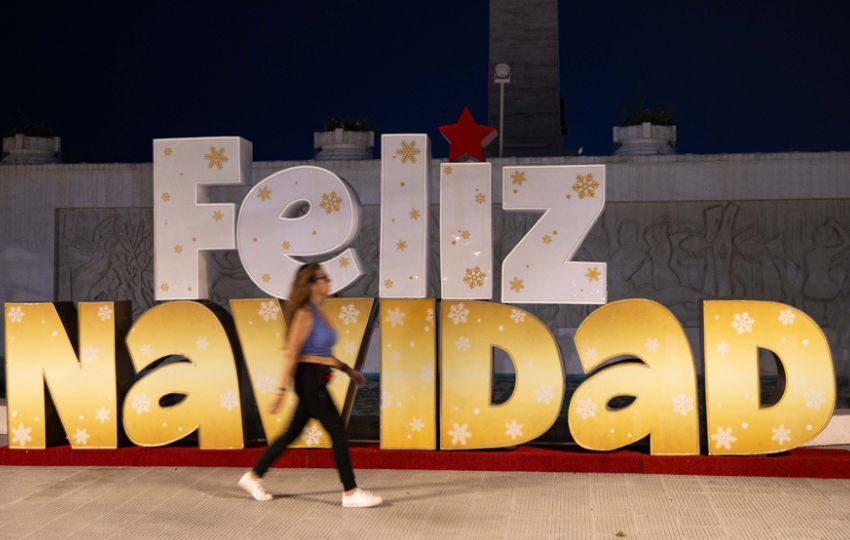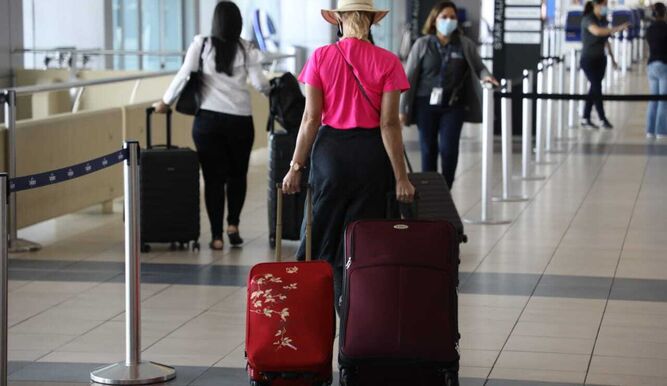Despite U.S. Threats Venezuelans Welcome Their Early Christmas with Relative Normality
The celebration began on October 1st, and various areas of Caracas have begun decorating. A person walks past Christmas decorations on Tuesday in Caracas, Venezuela, pictured below.

Starting Wednesday, Venezuelans will once again receive an early Christmas from President Nicolás Maduro, amid tensions over the U.S. military deployment near their waters, which has failed to disrupt the country’s relative normality, marked by economic hardship, failures in basic services, and heightened political uncertainty following the 2024 presidential elections. It’s business as usual: students attend classes, employees go to work, public transportation is busy, there’s traffic on the streets, shops are open, beaches are filled with bathers, and preparations for religious, artistic, and sporting events continue. Since August, the government has added to this daily routine by calling for mobilizations and other activities in response to the U.S. deployment, which it describes as a “threat” to sovereignty. Therefore, it has insisted on the call to enlist in the Militia and to participate in military training sessions.
But despite the specter of an “armed struggle,” a scenario contemplated by the government in the event of an attack, citizens continue with their daily routines. “The economic problem has been the worst threat we face; there’s no purchasing power,” Yuraima Mena, a 65-year-old pensioner who was with her husband on a Caracas boulevard, told reporters. Maduro said he wanted Christmas to be brought forward so that “people would focus on that” and not “on the main problem, which,” she said, “is the dollar.” Mena—who subsists on a pension of 130 bolivars (0.72 cents at the official rate) and a bonus called “income against the economic war” equivalent to almost $50—said that the rising price of the currency and the rise in product prices are her “biggest concern” today, as well as her income, which, she asserts, “isn’t enough for anything.”
A Latent “Threat”
Merlis Rodríguez, an audiovisual studies student at a public university, visited the institution on Tuesday to register for the return of classes this month. Her daily life, that of “a student trying to get ahead by working,” as she described it to news media, remains “normal.” However, this 21-year-old woman admits to being afraid that “the threat” could materialize and that a potential conflict could spread beyond Caracas, including to the city where she lives with her parents, just over 40 kilometers from the capital. Meanwhile, Washington is defending the deployment as an operation against drug trafficking supposedly originating in Venezuela, a claim rejected by Caracas, which accuses the US of preparing “an increasingly aggressive attack” to bring about “regime change” and seize the South American country’s energy resources. On Monday, Executive Vice President Delcy Rodríguez said Maduro had “signed” a “decree of external commotion” that “gives the head of state powers and special faculties to act in matters of defense and security.”
The Christmas “Formula”
Maduro, as he has done in other years since coming to power in 2013, once again brought forward Christmas. The celebration begins on October 1st, and several areas of Caracas have begun to be decorated, including Paseo Los Próceres—a monument with fountains, squares, and statues of independence leaders —adjacent to the Fuerte Tiuna military complex. In the days leading up to the scheduled date, avenues, squares, trees, and electricity poles have been decorated, while some stores are already selling Christmas items. According to Maduro, this advance is a “formula” that has worked “very well for the economy, for culture, for joy and happiness.”
Alexander Omaña, a chicha vendor in a neighborhood of Caracas, has noticed that in recent weeks there are “more” people on the commercial boulevard where he has his stall, which he believes is related to the approaching Christmas season. “People go out to shop, people go out to walk, to go for a stroll. Christmas is coming, people go out to buy early,” said this 46-year-old man, who continues “working hard” and “so far,” he assures, sees that everything is “normal.” Christmas coincides with preparations for this month’s celebration of the canonizations of lay physician José Gregorio Hernández and nun Carmen Rendiles, and the start of the national baseball season, the sport of choice for Venezuelans.





